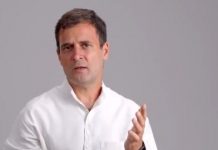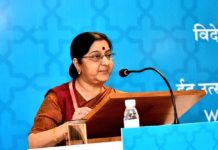Though worried over the deteriorating situation in the neighbouring country, India wants to ensure that the assistance it would extend percolates down to the common people and is not misused for fomenting terrorism.
With the International Monitoring Fund (IMF) further tightening its terms for offering financial support, Pakistani establishment, an euphemism for its army, is now facing the challenge of maintaining its hegemony in the governance of the country. Meanwhile, a large section of Pakistani civil society comprising members of academia, journalists and social activists are critical of India’s apathy towards the ongoing unprecedented economic crisis in the neighboring country.
It is being repeatedly stated that India’s financial budget 2023-24 allocates huge financial assistance to Bhutan, funds for Nepal, Myanmar, Sri Lanka and many countries of the region, but no funds for starving people of Pakistan, a twin born from the womb of the outgoing white mother, the House of Commons in 1947. It is also being stated that this apathy is rooted in the two-nation theory i.e. Hindus and Muslims are two separate nations. It was germinated in the British academia, nurtured in the cow-belt of northern India, and later India’s predominant Muslim populated regions of the north-western part and Bengal of united India were partitioned for setting up a client state, Pakistan, for serving the strategic interests of the western powers, now being led by the USA.
The recent comments of the Biden administrator that Pakistan is “fighting against terrorism” is indicative of some new American plan for its survival before it finally collapses. The Americans are appreciative of the successive rulers of Pakistan that they served their Anglo-American masters faithfully even at the cost of their country’s fragmentation in 1971, when its majority region emerged as Bangladesh, thus dumping the two-nation theory. It also appears that the Whitehouse is also ready to forgive the Pakistani army’s role in harbouring dreaded terrorists like Osama bin Laden and many others, who had engineered attack on New York in 2001.
The successive US administrations continue to recognize that Pakistan is their client state. In September, 2009, however, the then Secretary of State, Hillary Clinton, paying rich tribute to Abdul Gaffar Khan, popularly known as Badshah Khan, at an Iftar party in Washington, perhaps, was the indicative of the “new mood” regarding the American policy of using Islam for catering its strategic needs. Hillary had paid rich tribute to the Khan, a close colleague of Mahatma Gandhi during India’s freedom struggle. The Pashtun leader always believed that the tenets of Islam do not subscribe to violence, but are committed to the welfare of mankind and peace blended with India’s heritage. She was heard stating, “be inspired by our leaders to fight poverty, injustice and hatred with the weapon of the Prophet: patience and righteousness.”
Indian Silence on the Peshawar Blast
The reluctance of India in reacting to the recent blasts at a mosque in Peshawar could be traced to the recent adverse comments of Pakistani government against India, especially her PM Narendra Modi. It is being recalled that Modi had told the Indian Parliament that he personally had tried to befriend Pakistan, and also told the House that he had touched the feet of Badshah Khan, when he had come to Ahmadabad. Earlier, the then PM, Rajiv Gandhi, had visited Peshawar much against the advice of the then Pakistani dictator, Zia-ul Haq.
The blast at a mosque killing more than 100 namazis and severely wounding a large of the people praying at the ill-fated place of worship has saddened people across the Indian sub-continent. Amidst this violence, the members of civil society in Lahore had assembled during the first week of February 2023 to pay homage to Badshah Khan, who was being described as ‘a traitor’ of Islam since 1947 by successive governments in Pakistan and debunked by the Sunnis of the Wahabi and Barelvi sects, Shias and Ahmedis in India and Pakistan.
Yet the voices against this injustice are emerging in the heartland of Pakistan, but it is too early to reach to a definite conclusion, whether Pakistani are really ready to abandon the opium of the religion being given to them for the past 75 years.
Encouraging Dictators
It is being repeatedly recollected that how the USA, which had become the ‘mentor’ of Pakistan during the fifties was instrumental in quietly killing democracy in Pakistan even before the constitution of the country could be finalized and enforced. In 1950, Pakistan’s first PM, Liaquat Ali Khan, was sent special American aircraft to make an official visit to the USA. He, however, was allowed to retain the aircraft for another two months to tour the USA and Europe, which indeed had immensely pleased his wife, Begum Rana, a graduate of Lucknow University in India and the daughter of a Brahmin family.
It is often stated that Liaquat Ali had promoted Ayub Khan as the first commander-in-chief of the Pakistani army on the ‘polite advice’ of the Americans, who had become quite intimate with the Pakistani establishment after Liaquat’s visit to the USA. It may be noted that Ayub Khan was not in the panel of the army commanders sent to the PM to be considered for the top position. It was for the first time that during the recently held meeting in the memory of Badshah Khan, the American interference in the top army appointments was disclosed. In spite of these revelations, a large section of the civil society in Pakistan continues to expect that the Modi government should allocate substantial funds for the starving people of their country.
Awaiting Pakistani Response
The sources in New Delhi reveal that India’s blue-chip public sector undertaking, the Food Corporation of India, has already prepared a plan for sending trucks of foodgrains for the starving people of Pakistan. However, the concerned officials are awaiting the final instructions from the South Block. India just wants that the terrorist camps in Pakistan should be closed immediately and the terrorists responsible for violence in India should be handed over to India for trial. She has been telling Pakistani authorities that the terrorists responsible for attacks on Mumbai and Parliament are yet to tried and punished.
Yet, India is also worried that the growing ethnic conflicts accompanied by man-made economic crisis in Pakistan might further fragment the country. It is estimated that if Pakistan fails to retain its unity, India might face unprecedented refugee crisis. India does not want a repeat of the 1971, when the majority of its population had decided to leave Pakistan to become Bangladesh.
It is also being noticed that the IMF has asked the government of PM Shabaz Sharif to cut 30 percent of its army budget, and the payment of the retired army officers from the main budget has caused anxiety to the civilian government. It’s negotiators have sought two days time for further negotiations. In India, it is being keenly watched whether the GHQ at Rawalpindi would allow these suggestions or it might resort to martial law blaming the country’s politicians for the economic crisis. If it concedes the IMF conditions, its role in grabbing the country’s resources would be further exposed.
It is also being stated that in 1947, Mahatma Gandhi had resorted to fast forcing the Nehru government to cough up Rs. 55 crores (estimated to be more than one thousand crores today) to save it from ‘imminent financial collapse’. Interestingly, Pakistani army used this amount for obtaining weapons and ammunitions for intensifying its aggression in Jammu and Kashmir. India, perhaps, is rightly wary of extending full scale financial help to Pakistan without ensuring that the assistance really percolates down to the common people might renew terrorism in the country. Even the food grains and other supplies meant for the people might be grabbed by the GHQ.
Notice on Indus Waters Treaty
It is also being asked why India has asked for renegotiating the Indus waters treaty. In 1954, India and Pakistan had agreed to resolve the sharing of water of six rivers flowing from the high Himalayas originating in Tibet, now under the control of China, on the basis the World Bank report. After six years of talks, Nehru signed the Indus Waters Treaty in September 1960 with the then army dictator, president, Mohammad Ayub Khan. Under this accord, Pakistan receives the waters of the western tributaries, Indus or Sindhu, Jhelum and Chenab without giving any share to India. Similarly, India is allowed unrestricted use of the eastern rivers Beas, Ravi and Sutlej.
It may be mentioned that Pakistani has voiced its opposition to the upstream hydroelectric power stations in the rivers and tributaries of the rivers allocated to Pakistan. But as India is not using water for any other purpose, the World Bank did not entertain the Pakistani objections. However, with Pakistan’s decision to go for arbitration, India has to ask for renegotiating the treaty. India has issued notice to Pakistan, with a request for a response within 90 days. Interestingly, the treaty has survived despite the three wars the two countries have fought so far. Also, India and Pakistan continue to exchange the details of their nuclear weapons on January one every year. It has been done in 2023 too.
Its impact, however, has to be assessed in the light of the contemporary strained relations between the two countries. In India, Pakistan is being blamed for pushing the World Bank for a Court of Arbitration, which actually is against existing channel of dispute resolution through a “neutral expert” appointed by the World Bank.
India’s demand for renegotiating the 62-year-old treaty could be traced to Pakistan’s continued opposition to the Kishenganga and Ratle hydropower projects. India’s huge investment in the projects is being wasted due to the Pakistan’s opposition. Pakistan should have invoked the process already provided in the treaty, but it chose to approach a court of arbitration at The Hague. India is already boycotting the court process.
India has been stressing that each step must be fully exhausted before both sides agree to moving on to the next step, Pakistan had moved on without waiting for India’s concurrence. The neutral expert last met with Indian and Pakistani negotiators in November 2022, while the Permanent Indus Water Commission last met in Delhi in May 2022, and is due to be held in Lahore this year.
The multiple crisis in Pakistan has forced New Delhi to remain watchful of the new political and economic developments taking place in Pakistan.













